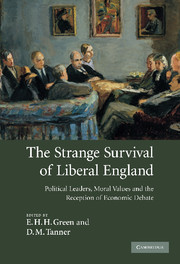 The Strange Survival of Liberal England
The Strange Survival of Liberal England Book contents
- Frontmatter
- Contents
- Acknowledgements
- List of abbreviations
- List of contributors
- Introduction
- Part I Economic ideas and political leaders
- Part II The use and abuse of economic ideas: Keynes and his interpreters
- 5 The Labour party and Keynes
- 6 The Conservative party and Keynes
- 7 Keynesian ideas and the recasting of Italian democracy, 1945–1953
- Part III Economic forces and their significance
- Index
6 - The Conservative party and Keynes
Published online by Cambridge University Press: 04 July 2009
- Frontmatter
- Contents
- Acknowledgements
- List of abbreviations
- List of contributors
- Introduction
- Part I Economic ideas and political leaders
- Part II The use and abuse of economic ideas: Keynes and his interpreters
- 5 The Labour party and Keynes
- 6 The Conservative party and Keynes
- 7 Keynesian ideas and the recasting of Italian democracy, 1945–1953
- Part III Economic forces and their significance
- Index
Summary
The Conservative party and Keynes may seem an unlikely pairing. In the 1920s and 1930s it was, above all, Conservative administrations that Keynes found himself ranged against as he sought, in vain, to persuade governments to pursue more active policies to counter mass unemployment. The Conservative leader from 1923 to 1937, Stanley Baldwin, was a particular target. In November 1923, Keynes described a speech by Baldwin in Manchester as an example of ‘the exaltation of a sort of mystical stupidity, with which the Tory, generally sentimentalising himself on these occasions as the “plain, business man”, likes to present his nostrums for the cure of economic facts’. Baldwin was by no means the only Conservative to endure Keynes's criticism and scathing wit. Winston Churchill's decision to return to the Gold Standard received a powerful broadside (in The Economic Consequences of Mr Churchill) whilst those who backed his decision were accused of supporting ‘what is jejune and intellectually sterile; and since it has prejudice on its side, it can use claptrap with impunity’. Conservative advocates of extreme laissez-faire were subject to Keynes's particular hostility, but he was also clear that attempts by ‘more moderate Conservatives, under Mr Baldwin … to temper the same logic with mercy and expediency’ were fruitless as they were at ‘the mercy of the noisy anti-trade union, anti-communist, anti-everything man who has always been the muscle and brawn of their party’.
- Type
- Chapter
- Information
- The Strange Survival of Liberal EnglandPolitical Leaders, Moral Values and the Reception of Economic Debate, pp. 186 - 211Publisher: Cambridge University PressPrint publication year: 2007
